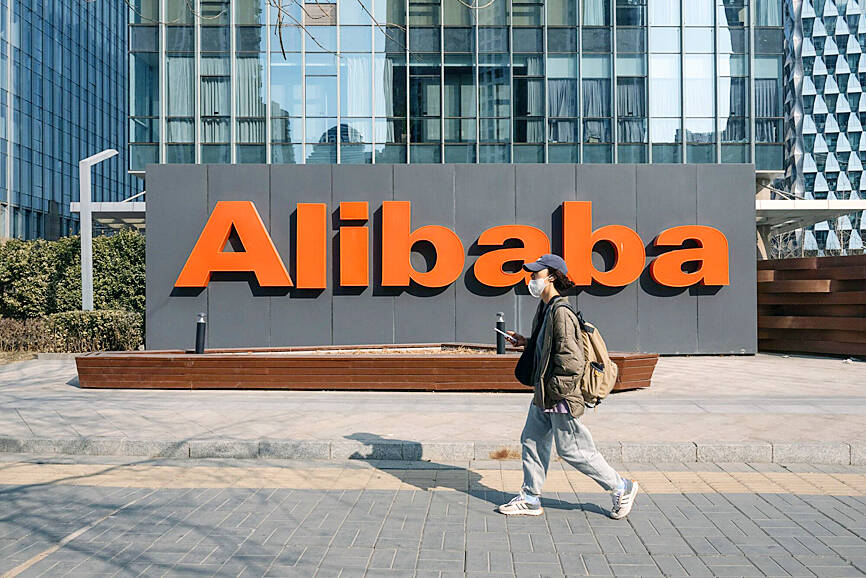Chinese e-commerce firm Alibaba Group Holding Ltd (阿里巴巴) on Wednesday approved an additional US$25 billion authorization to its share buyback program, after reporting lower-than-expected sales revenue for the final quarter of last year.
The company’s Hong Kong-traded shares plunged 6.8 percent yesterday. Alibaba’s New York-listed stock price sank 5.9 percent on Wednesday and has fallen nearly 26 percent over the past year.
Alibaba posted a 5 percent annual increase in sales to 260.3 billion yuan (US$36.35 billion) in the quarter that ended in December last year, slightly missing analysts’ estimates. Net income sank to 14.4 billion yuan, down 77 percent compared to a year earlier.

Photo: Bloomberg
The Hangzhou, China-based firm attributed the drastic decrease to declining values of its equity investments and falling revenues.
Alibaba has struggled to sustain its growth and faces increasing competition in the e-commerce sector from rivals such as PDD Holdings Inc (拼多多), which operates Pinduoduo, and ByteDance Ltd (字節跳動), which runs both TikTok and Douyin (抖音).
On a call with analysts, Alibaba chairman Joseph Tsai (蔡崇信) said that the company no longer plans to list shares in its logistics unit Cainiao Smart Logistics Network Ltd (菜鳥網路) and its Freshippo (盒馬鮮生) grocery business unit, given “challenging market conditions.”
Earlier, the group scrapped plans to spin off its cloud business, citing uncertainties over US export curbs on advanced chips used for artificial intelligence.
Alibaba is looking to sell off some of its non-core holdings, including several retail operations, he said.
“We have a number of traditional physical retail businesses on our balance sheet, and these are not our core focus,” Tsai said.
The company initially restructured its businesses in March last year, splitting them into six units that would eventually raise their own capital and go public to improve shareholder value.
Trying to rev up its growth, in December last year Alibaba named current chief executive officer Eddie Wu (吳泳銘) as the new head of its e-commerce business, replacing longtime Alibaba executive Trudy Dai (戴珊). That came weeks after rival PDD surpassed Alibaba in market value.

SELL-OFF: Investors expect tariff-driven volatility as the local boarse reopens today, while analysts say government support and solid fundamentals would steady sentiment Local investors are bracing for a sharp market downturn today as the nation’s financial markets resume trading following a two-day closure for national holidays before the weekend, with sentiment rattled by US President Donald Trump’s sweeping tariff announcement. Trump’s unveiling of new “reciprocal tariffs” on Wednesday triggered a sell-off in global markets, with the FTSE Taiwan Index Futures — a benchmark for Taiwanese equities traded in Singapore — tumbling 9.2 percent over the past two sessions. Meanwhile, the American depositary receipts (ADRs) of Taiwan Semiconductor Manufacturing Co (TSMC, 台積電), the most heavily weighted stock on the TAIEX, plunged 13.8 percent in

A wave of stop-loss selling and panic selling hit Taiwan's stock market at its opening today, with the weighted index plunging 2,086 points — a drop of more than 9.7 percent — marking the largest intraday point and percentage loss on record. The index bottomed out at 19,212.02, while futures were locked limit-down, with more than 1,000 stocks hitting their daily drop limit. Three heavyweight stocks — Taiwan Semiconductor Manufacturing Co (TSMC, 台積電), Hon Hai Precision Industry Co (Foxconn, 鴻海精密) and MediaTek (聯發科) — hit their limit-down prices as soon as the market opened, falling to NT$848 (US$25.54), NT$138.5 and NT$1,295 respectively. TSMC's

TARIFFS: The global ‘panic atmosphere remains strong,’ and foreign investors have continued to sell their holdings since the start of the year, the Ministry of Finance said The government yesterday authorized the activation of its NT$500 billion (US$15.15 billion) National Stabilization Fund (NSF) to prop up the local stock market after two days of sharp falls in reaction to US President Donald Trump’s new import tariffs. The Ministry of Finance said in a statement after the market close that the steering committee of the fund had been given the go-ahead to intervene in the market to bolster Taiwanese shares in a time of crisis. The fund has been authorized to use its assets “to carry out market stabilization tasks as appropriate to maintain the stability of Taiwan’s

In a small town in Paraguay, a showdown is brewing between traditional producers of yerba mate, a bitter herbal tea popular across South America, and miners of a shinier treasure: gold. A rush for the precious metal is pitting mate growers and indigenous groups against the expanding operations of small-scale miners who, until recently, were their neighbors, not nemeses. “They [the miners] have destroyed everything... The canals, springs, swamps,” said Vidal Britez, president of the Yerba Mate Producers’ Association of the town of Paso Yobai, about 210km east of capital Asuncion. “You can see the pollution from the dead fish.